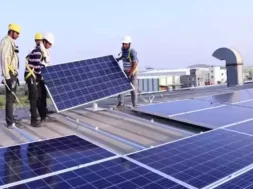
Whether it’s smarter wind turbines, more flexible solar photovoltaic technologies, or breakthrough algae biofuel, renewable energy innovation is grabbing headlines. And it should be, considering its importance to the global energy landscape.
By 2050, the global population will demand roughly 80% more energy than it does today. Meeting this growing demand poses a tremendous challenge, especially given the need to dramatically reduce emissions to avoid the worst effects of climate change.
To do this, we must scale up renewable energy while phasing out fossil fuels. And we are making progress; renewable energy capacity additions hit a record high in 2015 and have outpaced fossil fuel capacity additions since 2011. But as the share of renewable energy continues to grow, we will need to discover new ways to manage and govern our energy systems, to promote and deploy renewable technologies, to finance their upfront costs, and to maximise their multiple benefits.
Enter renewable energy innovation.
“Reaching higher shares of renewable energy in the power sector will bring new opportunities and new challenges,” said IRENA Director-General Adnan Z. Amin. “Innovation is critical to harness the opportunities and overcome the challenges.”
Energy experts and stakeholders from 50+ countries are gathering in Bonn, Germany this week for IRENA’s first-ever Innovation Week event. Together, they will work to foster renewable energy innovation and build momentum to translate ambitious renewable power targets to action on the ground.
As a warm-up, attendees today visited the E.ON Energy Research Center in Aachen, Germany. While the town is small, the ideas being generated and tested onsite are anything but. The 125+ scientist, researchers and engineers on site are working to answer key question like: how can we improve our electricity distribution system to get more power to the places that need it? How can we store variable renewable energy – like wind and solar power – to master the balance between supply and demand? How can consumers and prosumers (someone who consumes AND produces electricity), be engaged in making energy use more efficient?
Finding answers to these questions is going to be vital to completing the needed global energy transition.
Over the next three days, IRENA Innovation Week aims to explore what the “The Age of Renewable Power” will look like in different countries around the world, how innovation is directing and enabling this energy transition, and how international cooperation efforts could strengthen the transition.
Innovation Week is organised around one central tenet: innovations are the outcome of a number of factors working in tandem. The latest technology developments allow for new business models and operational approaches, whilst innovative regulatory frameworks and policies may trigger new technical and operational innovation. When one of these elements stagnates, progress is halted. When all these elements are enabled and streamlined, new opportunities are created to add value and pursue sustainable development.














